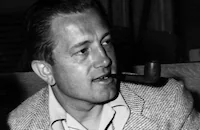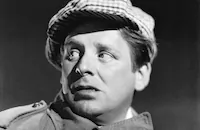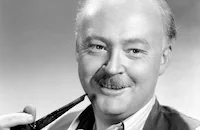Warlock

Brief Synopsis
Cast & Crew
Edward Dmytryk
Richard Widmark
Henry Fonda
Anthony Quinn
Dorothy Malone
Dolores Michaels
Film Details
Technical Specs

Synopsis
In the frontier town of Warlock, the San Pablo gang, a sadistic band of cowboys led by Abe McQuown, wages a campaign of wanton killing and anarchy while the citizens stand idly by. Rather than face certain death at the hands of McQuown, Deputy Roy Thomson hightails it out of town and is brutally humiliated by the gang. Sickened by the senseless violence, gang member Johnny Gannon starts to question McQuown's authority. Now devoid of all law, the Warlock Citizen's Committee votes to hire infamous gunman Clay Blaisdell to act as marshal and protect the town. After making a deal with the committee for $400 a month plus the management of the Palace Saloon, the local gambling parlor, Blaisdell arrives in town with his storied gold-handled pistols and his partner and close friend, Tom Morgan, a crippled gunslinger. Blaisdell immediately warns his employers that they will soon come to hate and resent him. That night, McQuown's gang rides into town to challenge Blaisdell, and the taunts of Curley, one of the cowboys, prompts Blaisdell to draw his gold-handled Colts. After getting the drop on Curley, Blaisdell holds his fire and then warns that he will kill anyone who draws on him and that troublemakers will not be allowed in town. Defeated, McQuown and his boys leave and Johnny decides to quit the gang. Impressed by the marshal's nonviolent approach, Jessie Marlowe, the pretty daughter of one of the town's founders, apologizes for misjudging him. Later, Morgan learns that the stage is carrying Lily Dollar, his former lover, and her companion, Bob Nicholson, and gallops out to overtake it before it can reach town. From a ridge, Morgan watches as McQuown's men stop the stage to rob it. Training his rifle on Nicholson, Morgan shoots and kills him and then disappears into the hills. Upon reaching town, the stage driver identifies one of the robbers as Billy Gannon, Johnny's brother, but Lily insists that a third man killed Nicholson. As Blaisdell leads a posse to San Pablo, Lily goes to the Palace and contemptuously accuses Morgan of murdering Nicholson. Years earlier, Lily fell in love with Nicholson's brother Ben, compelling the obsessively jealous Morgan to manipulate Blaisdell into killing Ben in a gunfight. When Blaisdell returns with his prisoners, the blood-thirsty crowd calls for a lynching and breaks into the jail. After Blaisdell disperses the crowd, the county sheriff arrives to take the prisoners into custody. Castigating the town for hiring a high-priced gunman, the sheriff challenges one of them to accept the job of deputy sheriff, and Johnny eagerly volunteers. After the San Pablo boys are acquitted by a crooked judge, Blaisdell warns that he will kill them if they step foot in Warlock. Touched by Johnny's earnestness, Lily invites him to dinner and asks why he left McQuown. Johnny, troubled, traces his decision to the day that McQuown and his men massacred 37 helpless Mexicans. One day, Jessie seeks out Blaisdell to warn him that Billy and the others are headed for Warlock. When Blaisdell calls her an angel, Jessie discloses that she is restless and unhappy and they kiss. The next morning, Morgan, anxious to finish their business in Warlock and move onto the next town, tells Blaisdell that the McQuown gang has reached Warlock, and Blaisdell informs him that he has decided to settle down and marry Jessie. As Blaisdell and Morgan march out to meet the outlaws, Johnny asks to speak to Billy. Johnny's attempts to reason with his brother fail, however, and Billy calls out Blaisdell. After Billy fires at Blaisdell, the marshal guns him down and Billy dies in his brother's arms. In retaliation, Skinner, one of McQuown's men, institutes a council of "regulators" to deal with Blaisdell. Forecasting that an army of cowboys will soon come to wreak havoc on the town, Morgan urges Blaisdell to move on but Johnny asserts that it is his job to keep the peace. After Blaisdell delegates his authority to Johnny, Johnny rides to San Pablo to warn McQuown to stay out of Warlock. Although McQuown vindictively slashes Johnny's gun hand, Johnny is undeterred and returns to town to face down the gang. Fearing for Johnny's life, Lily asks Blaisdell to help him, asserting that Blaisdell owes her for killing Ben Nicholson. When McQuown's men appear, Morgan pulls his gun on Blaisdell and holds him prisoner, rendering him unable to come to Johnny's aid. Johnny impassively faces McQuown, but when one of the gang tries to shoot him in the back, Skinner kills the man, assuring a fair fight. McQuown, a slow draw, is then outgunned by Johnny, who arrests the regulators. Finally realizing that Morgan goaded him into killing Nicholson, Blaisdell breaks with his long-time partner. Insane with hatred, Morgan gets drunk, shoots up the saloon and then staggers into the street, gunning for Johnny. Claiming that Morgan is his responsibility, Blaisdell locks Johnny in a cell and then commands his old friend to leave town. When the crowd begins to jeer at him, Morgan boasts that he can beat Blaisdell and draws his gun. Blaisdell fires back, killing him, and then carries Morgan's lifeless body to the saloon. In pain over his loss, Blaisdell sets the saloon on fire and Johnny tells him that the time has come for him to move on. Blaisdell vows he will never go without a fight, and when Jessie pleads with him to stay with her, he muses that he is nothing without his guns. The next morning, Blaisdell faces Johnny. After drawing first, Blaisdell holds his fire, throws down his golden-handled pistols and then rides out of town.

Director

Edward Dmytryk
Cast

Richard Widmark

Henry Fonda

Anthony Quinn

Dorothy Malone
Dolores Michaels

Wallace Ford

Tom Drake

Richard Arlen
Deforest Kelley

Regis Toomey

Vaughn Taylor

Don Beddoe

Whit Bissell
Bartlett Robinson
J. Anthony Hughes

Donald Barry
Frank Gorshin
Ian Macdonald
Stan Kamber
Paul Comi
L. Q. Jones
Mickey Simpson
Robert Osterloh
James Philbrook
David Garcia
Robert Adler
Joel Ashley
Walter Coy
Harry Worth

Ann Doran
Joseph Turkel
Harry Carter
June Blair
Saul Gorss
Wally Campo
Alan Roberts
Bobby Folkerson
Hugh Sanders
Steve Darrell
Alex Finlayson
Joe Yrigoyen
Michael Morgan
Mort Marshall

George Robotham
Roy Sickner
Ray Jensen
Crew
L. B. Abbott
Del Acevedo
Robert Alan Aurthur
Al Bertsch
Herman A. Blumenthal
Alfred Bruzlin
Doris Burkus
Ted Coodley
Frank Coroy
Edward Dmytryk
Leonard Doss
Fred Etcheverry
Les Everson
Til Gabbani
Jack Gertsman
Don Greenwood
Leigh Harline
Charles Hixon
Jack W. Holmes
Stanley Hough
Joe Janich
Earl Johnstone
Bert Kershner
Charles Lemaire
Harry M. Leonard
Betty Levin
George Light
Joe Macdonald
W. A. Machado
Steve Marsh
Owen Mclean
Robert Moyse
Jesse Munden
Lionel Newman
Ray Nolan
Gordon Novak
Ben Nye
Marjorie Plecher
Edward B. Powell
Rodd Redwing
Stuart A. Reiss
William Roberts
Walter M. Scott
Roger Shearman
Helen Turpin
Lyle R. Wheeler
Mike Wood
Saul Wurtzel
Ralph Zerbe

Videos
Movie Clip




Hosted Intro
Film Details
Technical Specs

Articles
Warlock (1959)
Widmark had originally been cast in Warlock as Clay Blaisedell, a steel-eyed gambler/gunman in the Wyatt Earp mode who is hired to restore order to a frontier town plagued by cowboy criminality. By Widmark's suggestion, that part was offered instead to Henry Fonda (then serving out a two-picture deal with Fox) while he settled for the less flashy role of reformed road agent Johnny Gannon, whose stab at redemption compels him to sign on as Warlock's duly-sworn deputy sheriff. (The acutely status-conscious Widmark did retain first billing.) To add more testosterone to this adaptation of Oakley Hall's source novel, a finalist for the 1958 Pulitzer Prize for fiction, Anthony Quinn was slotted in as Fonda's crippled helpmeet (whose slavish devotion to his "super-human" friend borders on a bro-mance of Brokeback Mountain [2005] proportions) while the cadre of owlhoots plaguing Warlock was fleshed out by such promising studio players as Stanley Kubrick regular Joe Turkel, future Batman villain Frank Gorshin, Star Trek's DeForest Kelley and 2001: A Space Odyssey's Gary Lockwood, who speaks nary a word in his film debut.
After a decade as little more than eye candy for RKO and Warner Brothers, Dorothy Malone was enjoying more interesting roles as she matured beyond ingénue status. She had excelled in a string of minor but impressive crime films (Pushover [1954] for Columbia, Loophole [1954] for Allied Artists and The Fast and the Furious [1955] for American International Pictures) and had taken home an Oscar® for her work in Douglas Sirk's Written on the Wind (1956) when she was cast in Warlock as Lily Dollar, Widmark's love interest, vengeful showgirl. Although they make persuasive lovebirds onscreen, the pair came to blows during shooting. When Malone slapped him twice in rehearsal, Widmark's response was to punch his leading lady and call her "a no-talent bum." Dmytryk had his actors repair to their respective dressing rooms to cool off but called them back to shoot their scene before the tension between them had dissipated completely. After Dmytryk captured his scene and called cut, Widmark burst into laughter when he saw that cinematographer Joseph MacDonald had hung up a pair of boxing gloves on the set, along with a sign reading "Hail the Champ!"
Producer: Edward Dmytryk
Director: Edward Dmytryk
Screenplay: Robert Alan Aurthur (screenplay); Oakley Hall (novel)
Cinematography: Joe MacDonald
Art Direction: Herman A. Blumenthal, Lyle R. Wheeler
Music: Leigh Harline
Film Editing: Jack W. Holmes
Cast: Richard Widmark (Johnny Gannon), Henry Fonda (Clay Blaisedell), Anthony Quinn (Tom Morgan), Dorothy Malone (Lily Dollar), Dolores Michaels (Jessie Marlow), Wallace Ford (Judge Holloway), Tom Drake (Abe McQuown), Richard Arlen (Bacon), De Forest Kelley (Curley Burne), Regis Toomey (Skinner).
C-121m. Letterboxed. Closed Captioning.
by Richard Harland Smith
Sources:
Richard Widmark: A Bio-Bibliography by Kim R. Holston (Greenwood Press, 1990)
Henry Fonda: A Bio-Bibliography by Kevin Sweeney (Greenwood Press, 1992)
Edward Dmytryk biography, American National Biography, Volume 26 (Oxford University Press, 2005)
Oakley Hall obituary by William Grimes, The New York Times, May 16, 2008

Warlock (1959)
Frank Gorshin (1933-2005)
He was born on April 5, 1933, in Pittsburgh, Pennsylvania into a family of modest means, his father was a railroad worker and mother a homemaker. His childhood impressions of Edward G. Robinson and James Cagney paid off when he won a local talent contest at 17, and that led to his first gig at 17 at a the prize was a one week engagement at Jackie Heller's Carousel night club, Pittsburgh's hottest downtown spot in the day. The taste was there, and after high school Frank enrolled in the Carnegie-Mellon Tech School of Drama did hone his craft.
His career was interrupted briefly when he entered the US Army in 1953. He spent two years in Special Services as an entertainer. Once he got out, Frank tried his luck in Hollywood. He made his film debut in a forgettable William Holden vehicle The Proud and Profane, but his fortunes picked up soon when he and when he hooked up with American Internation Pictures (AIP). With his charasmatic sneer and cocky bravado that belied his slender, 5' 7" frame, Frank made a great punk villian in a series of entertaining "drive-in" fare: Hot Rod Girl (1956), Dragstrip Girl, Invasion of the Saucer Men, and of course the classic Portland Expose (all 1957).
By the '60s, he graduated to supporting roles in bigger Hollywood fare: Where the Boys Are, Bells Are Ringing (both 1960), Ring of Fire, and his biggest tole to date, that of Iggy the bank robber in Disney's hugely popular That Darn Cat (1965). Better still, Frank found some parts on television: Naked City, Combat!, The Untouchables, and this would be the medium where he found his greatest success. Little did he realize that when his skeletal physique donned those green nylon tights and cackled his high pitch laugh that Frank Gorshin would be forever identified as "the Riddler," one of Batman's main nemisis. For two years (1966-68), he was a semi-regular on the show and it brought him deserved national attention.
By the '70s, Frank made his Broadway debut, as the star of Jimmy, a musical based on the life of former New York City Mayor Jimmy Walker. He spent the next two decades alternating between the stage, where he appeared regularly in national touring productions of such popular shows as: Promises, Promises, Prisoner of Second Street, and Guys and Dolls; and nightclub work in Los Angeles and Las Vegas.
He recently found himself in demand for character roles on televison: Murder, She Wrote, Lois & Clark: The New Adventures of Superman and film: Terry Gilliam's Twelve Monkeys (1995), and the quirky comedy Man of the Century (1999). Yet his biggest triumph was his two year stint (2002-2004) as George Burns in the Broadway smash, Say Goodnight Gracie. It ran for 364 performances and he received critical raves from even the toughest New York theater critics, proving undoubtly that he was a performer for all mediums. He is survived by his wife Christina; a son, Mitchell; grandson Brandon and sister Dottie.
by Michael T. Toole
Frank Gorshin (1933-2005)
Quotes
Trivia
Notes
According to a January 1958 Hollywood Reporter news item, John Wayne was to star in the film. A September 1958 Hollywood Reporter news item noted that June Allyson was a likely choice for one of the top female roles. According to studio publicity, Joel Ashley replaced Edgar Hinton as "Murch" after Hinton was killed in a plane crash on October 12, 1958. Location shooting was done around Moab, UT, according to an October 1958 Hollywood Reporter news item.

Miscellaneous Notes
Released in United States 1959
Released in United States on Video May 1988
CinemaScope
Released in United States 1959
Released in United States on Video May 1988














